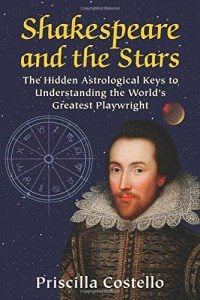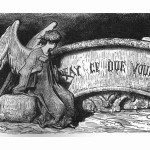
[Author’s Note: My book reviews for this column are based on a five star system with each star representing a quality the book has, does not have or partially has. The five star qualities are 1) it is an enjoyable read. 2) the author is qualified to write on the topic based on experience or research. 3) the book is well edited and organized. 4) the topic is covered well. 5) awareness.]
Learning planetary magic and astrological systems hasn’t come easy to me. Most of my life I vaguely understood my own sign and a few of my closest family and friends’. However there are twelve signs and many planets and star influences that haven’t stuck in my mind. As with anything, I can learn esoteric information better if I can apply it to things I already know.
If you are like me you haven’t memorized long correspondence tables and you just know the virtues of stones, herbs and other things you use regularly. What I do know is some Shakespeare. Just in the regular course of school I read Romeo and Juliet and the Scottish play. Additionally, between field trips to the famous Ashland, Oregon Shakespeare festival and school theater I saw half a dozen more. So when our channel editor, Jason Mankey, offered up Shakespeare and the Stars for review, I thought maybe this will finally be something I can easily relate to in astrology. I am pleased to say it is quite a good way for a theater fan to learn some the planets and zodiac signs.
Priscilla Costello leads us through a thoroughly researched and comprehensive review of Elizabethian astrological themes and Shakespeare’s masterful use of them. My educational focus was on culture and history and so this book was fascinating on both points for me. After she covers everything we want to know about the literary and metaphysical subjects of in the first half of the book, the second half examines six plays and the planet and sign they are keyed too. Although I am already familiar with most of the plays, it is helpful that the author summarized the plots of each at the beginning of their chapters.
I delighted in Midsummer Night’s Dream being the first play interpreted through the lens of the moon and Cancer. Midsummer Night’s Dream is one of the more popular plays for seeking witch lore among traditional witches. This play features as a unintentional ritual to summon the fair folk in both Puck of Pook’s Hill by Rudyard Kipling and Lords and Ladies by Terry Prachett. I figure I will be better prepared the recently released Elizabethian grimoire, the Book of Oberon, for having read this text first. A number of traditional witchcraft and fairy faith traditions work with Puck (sometimes by the cognate name of Bucca) and/or the fairy queen and king and Costello’s analysis of the play and it’s lunar elements drives its importance to witchery further home. Each play in turn is looking likewise looked over and details of the planet and sign it seems to be based on explained. Macbeth, the play most associated with witchcraft, is also analyzed with its ruler Mars and it’s sign Scorpio. Another favorite of Pagans included is the Tempest.
I marveled at the depth of knowledge, passion and expertise Priscilla Costello brought to this melding of subjects. As an English and Literature teacher of over 30 years and a professional astrologer, she is perfectly qualified to expound on this study of Shakespeare and Astrology. I am pleased to learn she founded and directs New Alexandria, a center for esoteric studies, because the foretells more lovely books of this syncretic nature.
For a book on Shakespeare, an author might not think to include non-European cultural elements nor touch on social politics. However, I was pleased that Costello utilized some esoteric teaches from beyond Europe including Japanese, Chinese, and Egyptian philosophy. And by choosing the Merchant of Venice as one of the plays was also able to address some issues of justice. I have to say that in this way she surpassed my expectations.
My only quibble with the book is its length. Although Priscilla is always interesting, she does go off on unfocused tangents when discussing Shakespeare’s oeuvre as a whole. I’d have liked it to have been more focused on the six plays for brevity. While this is not a problem on a first read through, I don’t think I will reread it nor reference it in the future. Generally books exceeding 500 pages in Pagan and New Age literature are reserved for guidebooks and grimoires. However, it’s a minor thing and overall I found this book excellent. I really save the perfect score for life changing books and new classics.
I give Shakespeare and the Stars my rating of 4 ½ stars. I highly recommend it to astrologers who like theater and literature; and theater and literature fans who are interested in astrology. I learned a lot and will be checking out her other book The Concise Guide to Astrology from Weiser at first opportunity.

Patheos Pagan on Facebook.

the Agora on Facebook
Star Made Witch is published bi-monthly on alternating Mondays here on the Agora. Subscribe via RSS or e-mail!
Please use the links to the right to keep on top of activities here on the Agora as well as across the entire Patheos Pagan channel.

















